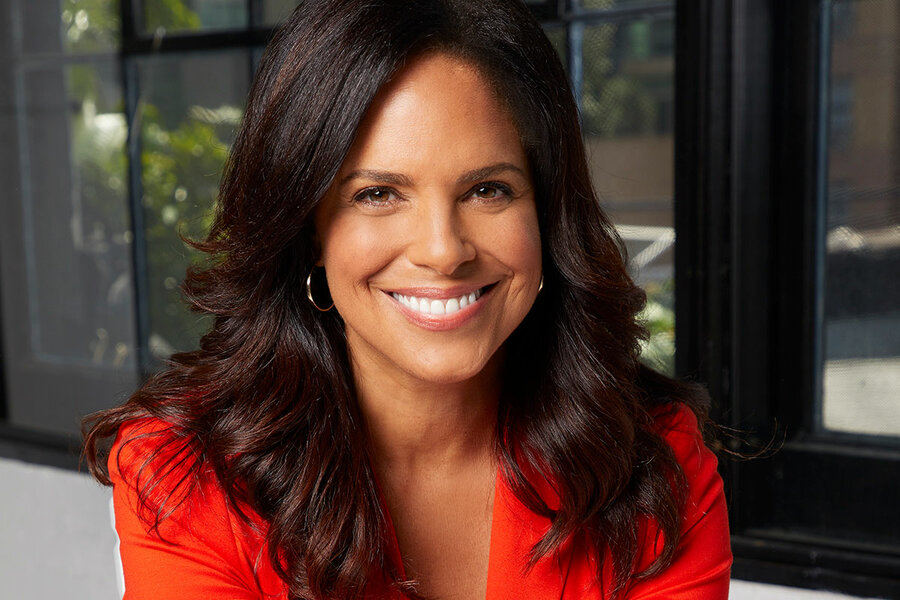‘So inaccurate’: Soledad O’Brien flips the narrative on Rosa Parks
Loading...
Soledad O’Brien is no stranger to pinpoint analysis and presentations. After a decade with NBC and MSNBC, she became a household name with CNN through her work on programs such as “Black In America.” Now, under her eponymous production company, Ms. O’Brien explores stories about “the divisive issues of race, class, wealth, poverty, and opportunity.”
In a conversation with the Monitor, Ms. O’Brien talks about her successes, the power of journalism to focus the nation’s attention, and her company’s recently released documentary, titled “The Rebellious Life of Mrs. Rosa Parks.”
Why We Wrote This
A story focused onWhen an icon is widely misunderstood, it takes fearlessness to correct the narrative. Soledad O’Brien does just that with a “brutally honest” documentary on the life and work of Rosa Parks.
The program goes beyond that day on the bus that made Rosa Parks an icon, to tell a fuller story of the woman who dedicated her life’s work to civil rights. Ms. O’Brien says she wanted to fix the misunderstanding that Ms. Parks was an “accidental” leader. At times that meant using uncomfortable language and getting into some of the civil rights movement’s radical elements.
“If you get the privilege of doing a story about Rosa Parks, you better get it right,” Ms. O’Brien says.
It is fitting that one of the country’s most well-known investigative journalists would take on a project to uncover the underappreciated legacy and contributions of one of the country’s most well-known civil rights figures.
Armed with autonomy and artistry, Soledad O’Brien was the executive producer of “The Rebellious Life of Mrs. Rosa Parks,” a documentary released last month on Peacock. The film was recently nominated for a Critics’ Choice Documentary Award, in the category of Best Biographical Documentary.
Ms. O’Brien is no stranger to pinpoint analysis and presentations. After a decade with NBC and MSNBC, she became a household name with CNN through her work on programs such as “Black In America.” Now, under her eponymous production company, Ms. O’Brien remains committed to “uncovering stories on the divisive issues of race, class, wealth, poverty, and opportunity through personal narratives.”
Why We Wrote This
A story focused onWhen an icon is widely misunderstood, it takes fearlessness to correct the narrative. Soledad O’Brien does just that with a “brutally honest” documentary on the life and work of Rosa Parks.
Ms. O’Brien recently spoke with the Monitor about the documentary and her legacy of investigative journalism. The conversation has been lightly edited.
What inspired the documentary?
The thing that really inspired the documentary was an excellent book by the same name, “The Rebellious Life of Mrs. Rosa Parks,” which was written by Jeanne Theoharis in 2013. One of the directors of the movie, Johanna Hamilton, always found it amazing that Theoharis would tweet all of these facts that you didn’t know, but should know, about Rosa Parks. Johanna was like, “I’m a well-read person, I’ve done a lot of civil rights history, and yet, Jeanne would tweet this list of 25 things, and I knew probably one, maybe two, of them.” [Next, Ms. Hamilton] reached out to Jeanne to talk about turning her book into a documentary, and then reached out to Yoruba Richen, another documentary producer, and the two of them decided they would partner and produce this doc. They brought the project to us and that was the start of it.
There’s a fearlessness that’s very clear regarding the documentary. Describe the urgency and deliberate nature of using terms such as “white supremacy.”
The beauty when you’re dealing with a documentary about a civil rights icon is I think you’re free to be a truth teller. And especially with this doc and especially with Rosa Parks, what is the point of what you’re doing if you’re not brutally honest? Rosa Parks was taking testimony from women who’d been raped. I can’t clean it up. … I didn’t know that that was her job, that she would travel around the country doing that. It just really changes your take on her, and I think my take was probably a lot like everybody else’s: She was a little old lady who was tired that one day on the bus, and it’s just so inaccurate.
On one hand, if you get the privilege of doing a story about Rosa Parks, you better get it right, and that means using the right words. Also, you know, when you run your own production company and people trust you to do a good job ... They’ve hired us to tell the true story. I’d feel worse if I were dishonest. I’d feel worse if I felt like I was editing things to make people comfortable.
In that same vein, there were radical elements, such as mentioning the Black Panthers and the RNA (Republic of New Afrika). Even within the framework of civil rights, many people don’t know about the “Free the Land” movement.
Exactly. I’m embarrassed to say what I knew about it was very much kind of like a middle school textbook. I just did not know. I very much admire Jeanne, because she really was interested in sharing the story of the actual woman. When Rosa Parks died, The New York Times called her the “accidental mother of civil rights.” Rosa Parks was a lot of things – accidental was not one of them. Her whole life’s work was in this. And so it’s a real misunderstanding of who she was. And I think it’s a tremendous luxury to get the opportunity to fix that, to change that.
Between this documentary and your production company, it seems that you’re able to tell stories that might not be in the national mainframe, even as a journalist who worked for CNN for many years.
CNN was really the place where I got to do documentaries, and it was such a great place to learn. I’m very grateful because I left CNN with like 50 hours of documentaries, and it was a place where I really figured it out and got to work with great people and understood what makes a great documentary. When we did “Black and Missing,” for example, for HBO, that was another documentary that was really successful. Those stories can be tough to sell, and they can be tough to get people to think they might want to watch. We’ve been pretty fortunate on that front so far.
One of your recent presentations on “Matter of Fact” hit really close to home – it was a report about the water crisis in Denmark, South Carolina, which was a point of reference for Democratic presidential candidates such as Bernie Sanders and Tom Steyer.
I think the most powerful thing you can do when you’re a journalist is to bring attention, right? That’s the job. We get to focus the nation’s attention on something that’s important, that maybe people are missing, or maybe people don’t realize that they need to be looking at. Being able to do that and bring attention to a story is very important. It’s essential, and again, I’ve always looked at it as a luxury. I’m often very frustrated by the idea of, you know, [journalists] thinking that people don’t think policy matters to them. It’s why they sometimes cover politics like it’s a joke, you know? I really felt very lucky to be able to go in and tell stories of communities and bring attention there when that attention is sorely needed.









